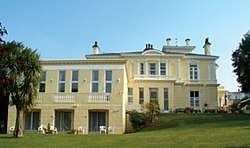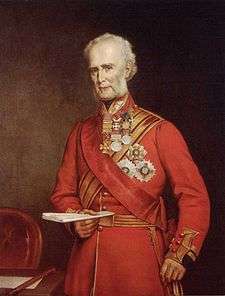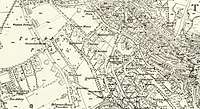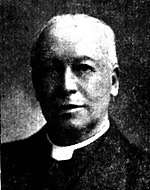Howden Court Hotel, Torquay
Howden Court Hotel in Torquay, Devon is a building of historical significance and is listed on the English Heritage Register.[1] It was built in about 1860 and was home to several notable residents over the next century. Today it is a hotel which provides accommodation, dining and bar facilities.

Early residents


Howden Court was a private villa called “Valetta” (sometimes spelt Valletta) when it was built in 1860 as the map to the left shows. One of the earliest residents was Field Marshall Sir John Colborne, 1st Baron Seaton. He was born in 1778 and entered the Army at an early age. He quickly rose through the ranks because of his outstanding abilities.[2] He was in the Battle of Waterloo in 1815 where his activities were widely acclaimed. Following the war he was promoted to colonel and became aide-de-camp to the Prince Regent. He was Lieutenant Governor of Guernsey in 1825 and after that Lieutenant Governor of Upper Canada from 1828 until 1836.
He retired in 1860 and spent some of his time at his estate: Beechwood House, Sparkwell. He also came to Valetta[3] in Torquay where he died in 1863 aged 85. There is a statue of him in Winchester which honours his achievements.[4]

By 1884 the house was owned by the Reverend Henry William Majendie. He was the Vicar of Torquay from 1884 until 1900. In 1890 he baptised Agatha Christie, who was then Agatha Mary Clarissa Miller. Her baptismal certificate is shown.[5] He was also responsible for the construction of the All Saints Church; having received a generous donation from Agatha's father, Frederick Miller. It was the place of worship of the Miller family throughout Agatha’s childhood. A newspaper article made the following comments about his efforts in the construction of the church.
- "During Mr Majendie’s incumbency of Torre the fine new church of All Saints was built at a cost of 12,000 pounds and it was mainly owing to the indomitable pluck and perseverance of the then vicar that it was accomplished."[6]
Rev. Henry William Majendie (1840-1923) was born in 1840 in Wiltshire. His father George John Majendie was also a vicar and his grandfather was the Bishop of Chester and Bangor. He was educated at the University of Oxford and obtained his B.A. in 1862 and M. A. in 1866.[7] In 1878 he married Alice Ann Bruce (1849-1912) who was the daughter of William Adair Bruce of Ashley House in Wiltshire. The couple had four daughters and one son.
Even though Howden Court was privately owned by Rev. Majendie, it became known as "Torre Vicarage" while he lived there as the Vicar of All Saints. The family is recorded in the 1891 Census as living in Croft Road with this house title. In that year he is shown there with his wife, five children, a cook, a parlourmaid, two housemaids and a nurse.[8] When his incumbency of Torre ended in 1900 he decided to rent the house to wealthy tenants and move to another part of Torquay.[9] It was then that the name was changed to "Crofton Tower".[10] In 1905 the name was changed again to "Howden Court".[11] The newspaper notes of these two changes are shown.
Later residents

From 1900 until about 1905 Rev Majendie rented the property to William Addington, 3rd Viscount Sidmouth (1824-1913). After that it was leased to William Thomas Jervis-Waldy and it was at this stage that the name was changed from Crofton Tower to Howden Court. He later bought it and lived there until his death in 1916. William Jervis-Waldy (1833-1916) was born in 1833 in Dorset. His father was Richard Waldy, a clergyman. He joined the 46th (South Devonshire) Regiment of Foot as an ensign in 1853 and three years later was a Captain. In 1854 the regiment was sent to the Crimean War (1854-56), serving at the Alma, Balaklava, Inkerman and Sevastopol battles, before moving on to Corfu (1856). He wrote a book about his life which included his time in the army. This was called "From eight to eighty: the life of a Crimean and Indian mutiny veteran" which can be read at this reference.[12]
He married twice as his first wife died in 1870. His second wife was Ada Juliana Margarite Amelia Montague (1849-1919) and they both came to Torquay after they rented Wedderburn Castle for some years from his cousin. He died at Howden Court in 1916[13] and his wife died in 1919. The property was sold soon after and became a hotel.
References
- English Heritage Register. Online reference
- Dictionary of Canadian Biography. Online reference
- Smith, M. “The Life Of John Colborne, Field-Marshal Lord Seaton”, Online reference
- Hampshire Chronicle, 2 June 1815. Online reference
- Who do you think you are magazine 20 Nov 2014. Online reference
- Torquay Times, and South Devon Advertiser - Friday 16 March 1906, p. 8.
- Western Morning News - Saturday 15 December 1923, p. 5.
- Census of Tormohan, District 8, 1891.
- Torquay Times, and South Devon Advertiser - Friday 16 March 1906, p. 8.
- Torquay Times, and South Devon Advertiser - Friday 28 September 1900, p. 5.
- Torquay Times, and South Devon Advertiser - Friday 09 June 1905, p. 5
- Jervis-Waldy, William Thomas 1914 “From eight to eighty :the life of a Crimean and Indian mutiny veteran”. Online reference
- Principal Probate Registry. Calendar of the Grants of Probate and Letters of Administration made in the Probate Registries of the High Court of Justice in England